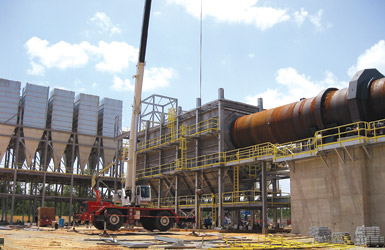But there is good news on the horizon. Forward-thinking companies are reinventing rural communities through public-private partnerships that are attracting new investment capital to support new enterprises and diversify their economies. Not only are they building job-creating enterprises, their success is rippling to the broader community.
Projects That Met The New Markets Program Criteria

-
Horsehead Corporation
Horsehead Corp.’s facility in Barnwell County, S.C., which recycles EAF dust, was brought to fruition through $10 million+ from the New Markets Tax Credit program.
Barnwell County, SC -
Associated Hardwoods Inc.
Associated Hardwoods Inc., a full-service wholesale lumber company headquartered in Cherokee County, South Carolina took the initiative to open its own sawmill in its backyard, where natural resources are abundant.
Cherokee County, SC -
Commonwealth Dairy
Commonwealth Dairy recognized that the economic benefits of Greek yogurt production would extend well beyond the plant walls and ripple through the rural, economically challenged community in southern Vermont. The promise of economic recovery in the region, coupled with the inability to secure financing from traditional sources, made this an ideal New Markets project.
Brattleboro, VT -
Premium Peanut
A cooperative company formed in late 2014, and owned by 225 peanut farmers, benefited from $23 million in NMTC capacity.
Southern Georgia
Take for instance the rebuilding under way in Barnwell County, South Carolina. In 2009, the community was reeling from the closing of the local textile plant that had been a signature employer in the region for more than 50 years. Then the closure of the Hanesbrands and Allied Air Enterprises plants followed. All told, more than 700 jobs were lost in a county with just 22,000 residents. The poverty rate soared to 20.7 percent, and the area was designated as an Economic Impact Zone by the state.
Local economic development agencies worked around the clock — and around the country — to attract new businesses to the area. They found success with Pittsburgh-based Horsehead Corporation, a leading U.S. producer of specialty zinc and zinc-based products, and among the world’s leaders in zinc recycling.
The timing was right. Horsehead was working on a way to expand its capacity for a new economy and continue to enhance its position in sustainable development. It wanted to construct a facility that would recycle Electric Arc Furnace (EAF) dust — a byproduct of the steel mini-mill industry — into a safe and useful material. EAF dust is classified by the EPA as a hazardous waste due to its concentration of heavy metals. But through its recycling process, Horsehead is able to transform that waste into products that can be used in brass manufacturing, battery production, and corrosion-resistant coatings.
As the company sought a site for its EAF dust-recycling operations it found the right elements in Snelling, in the heart of Barnwell County. The South Carolina Department of Commerce, the Barnwell County Economic Development Commission, the Southern Carolina Regional Development Alliance, the town of Snelling, and other agencies worked together to construct an economic development package, which relied on more than $10 million in New Markets Tax Credit capacity to bring the project to fruition.
Indeed, this project met the New Markets program criteria set by Congress for attracting capital to economically distressed census tracts. And it has succeeded in revitalizing the community. During 2014, Horsehead recycled 132,000 tons of EAF dust at that facility, which otherwise would have ended up in landfills. The operation supports 61 full-time positions with an average annual wage that well exceeds the county per capita level by 62 percent.
Forward-thinking companies are reinventing rural communities through public-private partnerships that are attracting new investment capital to support new enterprises and diversify their economies. Bolstering a Distressed Economy
Another company that employed a similar strategy to reinvent its business in the heart of a distressed rural economy is Associated Hardwoods Inc., a full-service wholesale lumber company headquartered in Cherokee County, South Carolina. With nationwide closures of sawmills straining the availability of raw materials, Associated Hardwoods took the initiative to open its own sawmill in its backyard, where natural resources are abundant. The company built a state-of-the-art mill that utilizes nearly 100 percent of the raw materials that are processed. The mill’s energy-efficient technologies and unique low-waste production process allow the company to substantially reduce energy costs and maximize the lumber recovery out of every log.
Because the facility employs 17 full-time workers in a census tract where one third of the population lives under the poverty rate and the unemployment rate is nearly double the national average, the project qualified for financing through the federal New Markets Tax Credit program. The average annual wage for employees at Associated Hardwoods’ new mill is 60 percent higher than the county living wage and includes overtime, medical insurance, paid vacation and holidays, and training opportunities.
But the project’s benefits reach far beyond Cherokee County. The sawmill supplies more than 20 percent of the raw materials for Associated Hardwoods’ operations in Granite Falls, significantly mitigating supply-chain risk to the parent company and helping it better serve its customers. Furthermore, the new mill provides a prime location for local loggers to bring their loads, reducing transportation costs, and maintenance supplies and services are being supplied by many local businesses.
Creative Financing
The New Markets Tax Credit program works across industry categories and geographies. It’s proven to be a creative financing solution for a Greek yogurt manufacturer that sought start-up financing in 2011 in order to establish a plant in rural Vermont. At that time, lending options were scarce as the nation’s economy was struggling to find its footing. Undeterred, the founders of Ehrmann Commonwealth Dairy recognized that the economic benefits of Greek yogurt production would extend well beyond the plant walls and ripple through the rural, economically challenged community in southern Vermont. The promise of economic recovery in the region, coupled with the inability to secure financing from traditional sources, made this an ideal New Markets project.

That’s not all. As with the other New Markets projects, the benefits are felt throughout the value chain. Now a cooperative of regional dairy farmers has a regular customer keeping its members employed, along with supporting veterinary, logistics, and farm support businesses. One more thing: With the dairy’s “triple bottom line” business, they donate 5 percent of sales to local nonprofits and last year wrote a check for $360,000 to the Vermont Farm and Forest Viability Program.
In Sum
As officials of economically distressed cities and counties seek investment to diversify their communities, many are finding that public-private partnerships with companies seeking to make a social impact, and the availability of New Markets financing, are attracting needed capital. Horsehead Corporation and Associated Hardwoods credit county and city officials for their cooperation and role in facilitating their efforts. The communities these companies call home also benefit significantly from their success, as the ripple effect is felt both locally and beyond — to the customers in their backyard, across the country, and around the world.